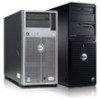Dell PowerEdge XL 5133-4 Dell PowerEdge FTOS Command Line Reference Guide for - Page 96
dcbx version
 |
View all Dell PowerEdge XL 5133-4 manuals
Add to My Manuals
Save this manual to your list of manuals |
Page 96 highlights
www.dell.com | support.dell.com dcbx version Configure the DCBX version used on the interface. Syntax dcbx version {auto | cee | cin | ieee-v2.5} To remove the DCBX version, use the no dcbx version {auto | cee | cin | ieee-v2.5} command. Parameters auto | cee | cin | ieee-v2.5 Enter the DCBX version type used on the interface, where: • auto: configures the port to operate using the DCBX version received from a peer. • cee: configures the port to use CEE (Intel 1.01). • cin: configures the port to use Cisco-Intel-Nuova (DCBX 1.0). • ieee-v2.5: configures the port to use IEEE 802.1az (Draft 2.5). Defaults Auto Command Modes PROTOCOL LLDP Command History Version 8.3.17.0 Supported on M I/O Aggregator Usage Information DCBX requires that you enable LLDP to advertise DCBX TLVs to peers. Configure DCBX operation at the INTERFACE level on a switch or globally on the switch.To verify the DCBX configuration on a port, use the show interface dcbx detail command. 94 | Data Center Bridging















